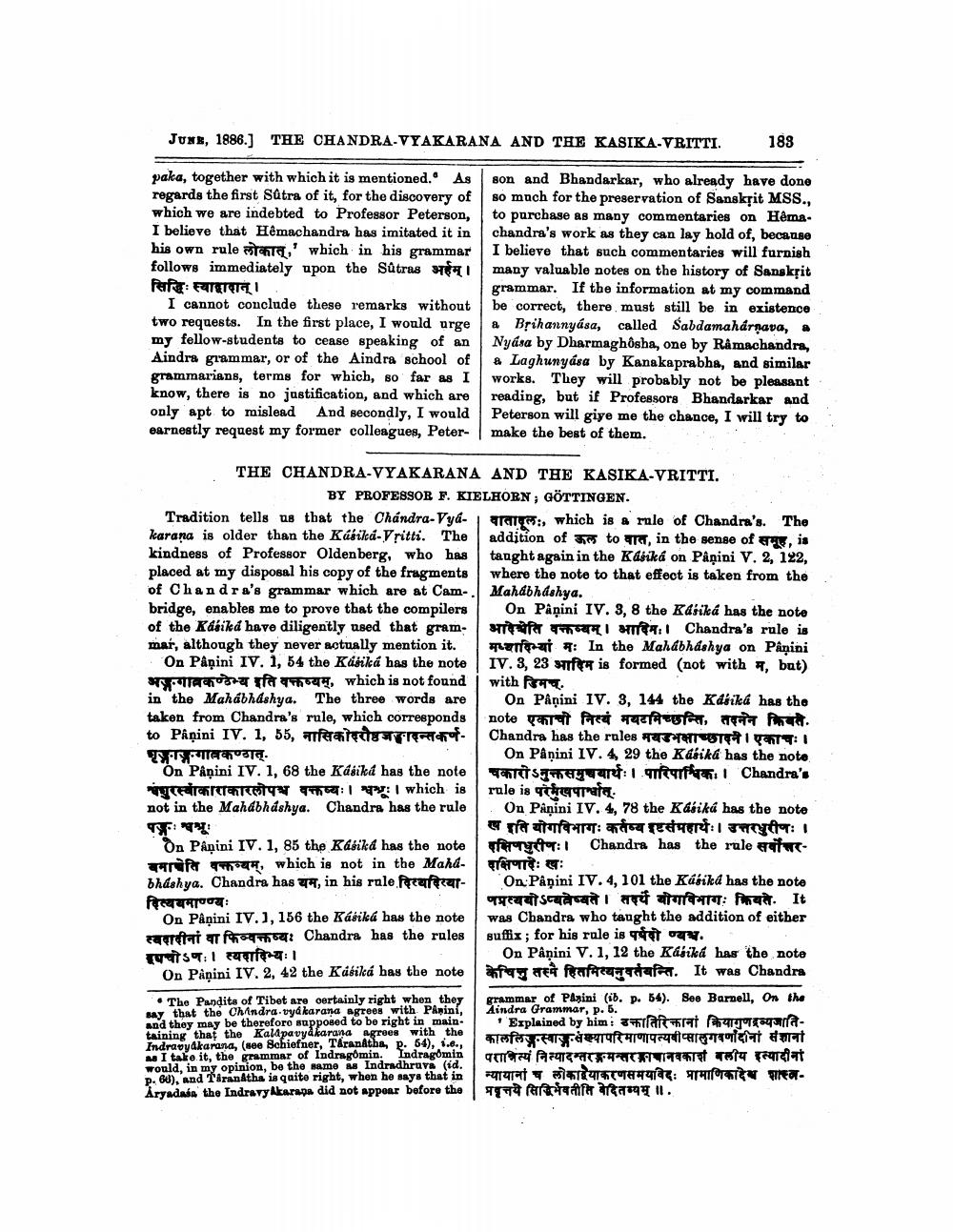________________
JUNE, 1886.) THE CHANDRA VYAKARANA AND THE KASIKA-VRITTI.
188
paka, together with which it is mentioned. As son and Bhandarkar, who already have done regards the first Sætra of it, for the discovery of so much for the preservation of Sansksit MSS., which we are indebted to Professor Peterson, to purchase as many commentaries on HemaI believe that Hêmachandra has imitated it in chandra's work as they can lay hold of, because his own rule Chie,' which in his grammar I believe that such commentaries will furnish follows immediately upon the Satras 97641 many valuable notes on the history of Sanskrit सिद्धिः स्वाहादात् ।
| grammar. If the information at my command I cannot conclude these remarks without be correct, there must still be in existence two requests. In the first place, I would urge | a Brihannyása, called Sabdamahárnava, my fellow-students to cease speaking of an Nyása by Dharmaghôsha, one by Ramachandra, Aindra grammar, or of the Aindra school of Laghunyása by Kanakaprabha, and similar grammarians, terms for which, so far as I works. They will probably not be pleasant know, there is no justification, and which are reading, but if Professors Bhandarkar and only apt to mislead And secondly, I would Peterson will giye me the chance, I will try to earnestly request my former colleagues, Peter- make the best of them.
THE CHANDRA-VYAKARANA AND THE KASIKA-VRITTI.
BY PROFESSOR F. KIELHORN, GÖTTINGEN. Tradition tells us that the Chandra-Vya G Fs, which is a rule of Chandra's. The karana is older than the Kásikd-Vritti. The addition of a to , in the sense of ry, is kindness of Professor Oldenberg, who has taught again in the Kasiká on Påộini V. 2, 122, placed at my disposal his copy of the fragments where the note to that effect is taken from the of Chandra's grammar which are at Cam-. Mahabhdshya. bridge, enables me to prove that the compilers On Pâņini IV. 3, 8 the Kasiká has the note of the Kdikd have diligently used that gram.
I I Chandra's rule is mar, although they never actually mention it. मण्यादिभ्यां मः In the Mahabhdshya on Pimini On Påņini IV. 1, 54 the Käsiká has the note IV.3, 23 fer is formed (not with #, but) z fet Thelg, which is not found |
with R . in the Mahábhashya. The three words are On Paņini IV. 3, 144 the Katika has the taken from Chandra's rule, which corresponds note एकाची नित्यं मयटमिच्छन्ति, तदनन किवते. to Paņini IV. 1, 55, Tede n of Chandra has the rules THTHI TATTI जगजगावकण्ठात्.
On Pâņini IV.4, 29 the Kdáika has the noto On PAņini IV. 1, 68 the Kásika has the note Sayt: Inferthi Chandra's y cercetat
: : which is rule is Terrar not in the Mahábhdshya. Chandra has the rule 1. On Panini IV. 4, 78 the Kabiká has the note
खइति योगविभागः कर्तव्य इष्टसंग्रहार्यः। उत्तरधुरीणः । On Paņini IV. 1, 85 the Katika has the note दक्षिणधुरीणः। Chandra has the rule सर्वोत्तरबमाचेति वक्तव्यम्, which is not in the Maha- T : bhashya. Chandra has ut, in his rule faraftar- On Pånini IV. 4, 101 the Kásikd has the note दित्यबमाण्ण्यः
Sca r i TT: Ang. It On Påņini IV.), 156 the Kášiká has the note was Chandra who taught the addition of either स्ववादीनां वा फिव्वक्तष्य: Chandra has the rales sufix; for his role is 90 v. - ( ST: Re :
On Panini V.1, 12 the Kasiká has the note On Påņini IV. 2, 42 the Kábiká has the note ayte faracenaft. It was Chandra • The Pandits of Tibet are certainly right when they grammar of Parini (ib. p. 64). See Barnell, On the say that the Chandra vydkarana agrees with Panini, Aindra Grammar, p.5. and they may be therefore supposed to be right in main. * Explained by him: Elaftrat
p o garataining that the Kallpavydkarana agrees with the Indrapydkarana, (see Schiefner, Taranthe, P. 64), 1.6.,
काललिजन्स्वानसंख्यापरिमाणापत्यवीप्सालुगवर्णादीनां संज्ञाना MI take it, the grammar of Indragómin. Indragðmin परात्रिस्यं नित्यादन्तरङ्गमन्तरजनचानवकाश बलीय इत्यादीनां would, in my opinion, be the same as Indradhruva (id. p. 63), and TiranAths is quite right, when he says that in न्यायानां च लोकाइयाकरणसमयविदः प्रामाणिकादेव शास्त्रAryadna the Indravy karapa did not appear before the प्रवृत्नये सिद्धिर्भवतीति वेदितम्यम् ॥.




